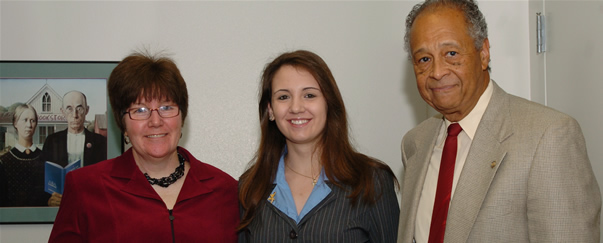Students Honored for Campaign Against Sweatshops
The Academic Senate recognized Caitlyn Whitney and Charlotte Samuels
June 5, 2007
By Valerie Orleans
After almost eight months of organizing, campaigning and meeting with university officials regarding the conditions of factories overseas, a student organization was recently recognized by the Academic Senate for its efforts to help ensure that clothing sold on campus is not created through sweatshop labor.
During the Academic Senate’s May 17 meeting, student leaders Caitlyn Whitney, a junior majoring in political science, and Charlotte Samuels, a January graduate with a bachelor’s degree in political science, were honored for their work on behalf of the Campus Coalition Against Sweatshops.
The organization was founded at CSUF in August 2006. In addition to planning and organizing against the sale of products made in sweatshops, the students visited with sweatshop workers in Tijuana. They also worked with the university bookstore.
Because of their efforts, Titan Shops is now affiliating with the Worker Rights Consortium, an independent labor rights monitoring organization that conducts investigations of working conditions in factories around the globe.
“Although this means no major changes for us, it does add an additional level of assurance that the products sold in Titan Shops are not being made in factories with poor labor practices,” said Chuck Kissel, director of Titan Shops, who noted that Cal State Fullerton is the only CSU campus among universities across the nation involved with the agency’s Designated Suppliers Program working group.
The working group’s goal, Kissel added, is that each year, over a three-year period, “an additional 25 percent of the total products made overseas and sold on college campuses are produced in a WRC-approved factory.”
The code of conduct required to be affiliated with WRC addresses the following issues: wages, hours of work, overtime compensation, freedom of association, workplace safety and health, compliance with local laws and women’s rights. The code also helps ensure that child and forced labor, harassment and abuse in the workplace, and discriminatory practices are not tolerated.
Cal State Fullerton has committed to require full and regularly updated public disclosure of factory locations, including those of contractors and sub-contractors.
“They really did a ton of work,” said Shelly Arsneault, assistant professor of political science who served as faculty adviser to the organization along with assistant Jarret Lovell, assistant professor of criminal justice. “Caitlyn and Charlotte made in-class presentations, held petition drives and fund-raisers — a lot of leg work to facilitate their efforts. They really got the word out.”


